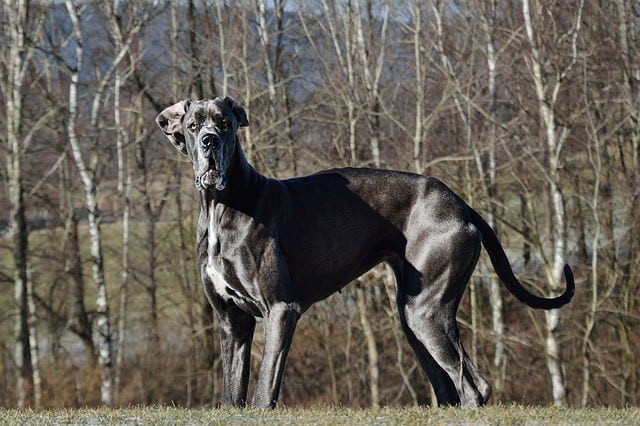Size and Breed-Related Puppy Growth Factors
It turns out that small dogs stop growing sooner than large dogs do.
This makes sense, as large breeds grow much more between the day they’re born and the day they stop growing than small breeds do.
Consider, for example, that Chihuahua puppies are born weighing about 5 ounces, and they reach about 5 pounds or so at maturity. This means they increase their size by a factor of 15.
On the other hand, a Great Dane puppy weighs about 1 pound at birth and 100 pounds or more at maturity.
This means that they exhibit a 100-fold difference in size over the course of their lives (and 200-pound Great Danes experience twice this much growth!).

Because it takes time to convert food into new tissue, large breeds must continue to grow over a longer period of time than their smaller counterparts.
On average, small breeds typically stop growing by the time they reach 6 to 8 months of age, but giant breeds grow until they are 12 to 18 months old.
Larger breeds can end up costing quite a bit more, as a perfectly sized puppy bed won’t last too long with a young Newfoundland.
This is also something to keep in mind with selecting a crate for your pup – you may be better off opting for a larger-sized crate and using dividers to keep the space suitably-sized until your growing dog needs more room!
Do dogs grow taller after 6 months?
Your dog’s growth trajectory after 6 months will largely depend on their breed and expected adult size. Small breed dogs will be close to their full size at 6 months, whereas larger dogs will be 2/3 of their adult weight. Giant breeds will be at around half of their full adult size.
0-3 Weeks – Milk Teeth and Debut
Puppies are born without teeth, and they’ll start to appear at around three weeks old. At the same time, your puppy’s eyes will open, and they gain their sense of smell.
Your pup will already have some of its teeth in place at birth, which will begin to show themselves over the next few weeks.
Puppies are born deaf and blind, so they rely on their sense of smell to explore their environment. They will begin to hear after ten days, and their eyesight will improve over the next two weeks.
Puppies cannot control their bodily functions and will urinate and defecate when they need to. You’ll need to work with your pup so that they learn where and when it is appropriate to relieve themselves.
When does YOUR PUPPY stop growing in height
Puppies develop rapidly, but there are certain stages in their life when they are more susceptible to disease, and their diet is crucial.
As your puppy grows, there are lots of milestones on the way, including teething, going to their new home, vaccinations, and neutering. There are also times when you should visit your vet because there could be a problem with your dog.
There are essential periods when your pup is most vulnerable to disease from birth to maturity, and they have special dietary requirements. To help you, we’ve put together a guide to puppy growth and development.
The following guide outlines what you need to know about your puppy’s growth and the concerns that affect each age group.